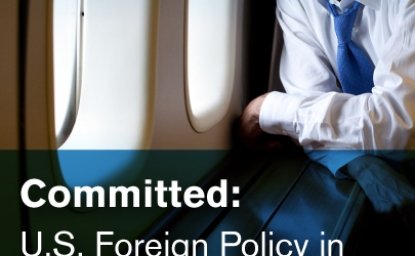Going Beyond Sanctions to Denuclearize North Korea
While denuclearization should remain the goal of U.S. policy, sanctions alone will not be enough to get North Korea to freeze these activities.
While denuclearization should remain the goal of U.S. policy, sanctions alone will not be enough to get North Korea to freeze these activities.
Summary
While denuclearization should remain the goal of U.S. policy, freezing North Korea’s nuclear and ballistic missile programs should be a priority. However, sanctions alone will not be enough to get North Korea to freeze these activities.
Policy Recommendations:
Recognizing the limits of sanctions on North Korea:
------
The United States has long sought to outsource its North Korea policy to China, beginning in the late 1970s as Washington prepared to normalize relations with Beijing, declassified U.S. records suggest. This approach reflects a poor understanding of the relationship between China and North Korea, exaggerates the docility of Pyongyang to Beijing, and enables China to reassert its traditional hegemony in the strategic region and directly challenge U.S. strategic interests. Without a doubt, China has more leverage and access to North Korea than any other country. However, that leverage does not translate to the ability to, at will, influence North Korea’s policies. U.S. policymakers should consider three critical factors as they seek a resolution to the North Korean nuclear conundrum.
The United States should not withdraw, nurse its bruised ego, call the North Koreans names, and apply additional sanctions that will hurt the North Korean people by curtailing the humanitarian work of NGOs but do little to stymie the further development of nuclear and ballistic missile programs.
First, China and the United States have very different interests on the Korean peninsula and in East Asia. While China prefers a nuclear-free and more compliant North Korea, it is not willing to bring the DPRK to its knees to achieve this goal. China’s leverage over North Korea, which is primarily gained through the economic lifeline it provides, is a double-edged sword. Cutting off this lifeline could lead to state and societal collapse in North Korea. This is the last thing Bejing wants. It would invite instability on China’s borders and precipitate a refugee crisis in Northeast China. The collapse of North Korea would also be a national security nightmare for China, which would then have to live with a U.S.-allied unified Korea on its border at a time when Beijing aspires to be the primary security actor in East Asia.
Second, there are limits to China’s leverage, despite North Korea’s economic dependence. In any unequal alliance relationship, there exist clear limits to the ability of the patron ally to influence, at will, the policies of the protégé. One of the major lessons of the Cold War is that smaller, dependent countries were able to pursue their own interests despite pressures from patron allies. Protégé allies on both sides of the Cold War conflict often exhibited a far greater degree of autonomy than had been previously assumed. Throughout the 1950s and 1960s, both South Korea and Taiwan, two key anti-communist allies of the United States, were utterly dependent on the U.S.’ economic and security assistance. Yet, U.S. officials, to their great frustration, were unable to impose their will on either Syngman Rhee or Chang Kai-shek. Indeed, so limited was the ability to restrain South Korean and Taiwanese officials that U.S. officials even feared becoming entangled in conflicts instigated by their allies. As Victor Cha has argued, the need to “constrain” anti-communist allies in South Korea and Taiwan led to the development of the unique “hub and spokes” security network that continues to exist in Asia today.[i] China’s ability to utilize its support to North Korea to influence Pyongyang’s policies throughout the Cold War was similarly limited. The same remains true today.
Third, and perhaps most importantly, declassified Cold War-era records from the archives of the former Soviet Union, East Germany, Mongolia, Romania, and others—all former allies of North Korea—reveal that North Korea’s relationship with China has been fraught with tension and mistrust. As early as the Korean War, Pyongyang viewed Beijing’s interference as heavy-handed.
In the late fall of 1950 the so-called Chinese People’s Volunteers, who had taken command of field operations in Korea, vetoed North Korean proposals to continue offensive operations against U.S. and South Korean troops in 1951. Consequently North Korean leaders blamed Chinese military officials for failing to reunify the Korean peninsula, even though Chinese forces had in fact rescued the DPRK from certain annihilation.
During the war disagreements also arose over control of North Korea’s railroad system. Chinese forces prohibited their use for anything other than military operations, including reconstruction after battle lines stabilized, a decision North Korean officials disputed, especially as many trains, standing still, fell prey to U.S. bombs. [ii]
After the war, North Korea’s founding leader Kim Il-sung (grandfather of current leader Kim Jong-un) demoted and arrested key officials in the ruling Korean Worker’s Party (KWP) who had close ties to the Chinese Communist Party (CCP), despite the continuing presence of tens of thousands of Chinese People’s Volunteers in the DPRK after the Korean War armistice.
In December 1955, Kim introduced the concept of “Juche,” an expression calling for the establishment of an autonomous national subjectivity, as a method of minimizing Chinese and Soviet influence on political, economic, and cultural developments. The next year, more pro-Chinese and pro-Soviet party officials were purged for challenging Kim’s autarkic economic development strategies and personality cult at a plenary meeting of the KWP.[iii] This time, however, Beijing and Moscow dispatched a joint Sino-Soviet party delegation that forced Kim Il-sung to convene a new meeting, reappoint purged officials, and release two others from prison to accompany the delegation back to China. Decades later Kim was still simmering with resentment in conversations with foreign communist leaders from Bulgaria and Mongolia.[iv]
Relations between Pyongyang and Beijing briefly improved in the early 1960s when the North Korean leadership had a falling out with Moscow, whose leadership of the Communist world China was by then disputing. But by the mid-1960s, during China’s Cultural Revolution, Kim Il-sung became a direct target of criticism for China’s Red Guards for allegedly “sitting on the fence” in the ongoing Sino-Soviet split. China’s leaders, who were in disarray, tolerated and even abetted these attacks. Relations deteriorated to the point where the Chinese and North Korean militaries clashed in the vicinity of Paekdu Mountain in 1969. According to a 1973 conversation between Kim and Bulgaria’s Todor Zhivkov, on another occasion Chinese troops crossed into North Korean territory and occupied a town. Kim ordered an attack, but the Chinese slipped back across the border.[v]
Relations showed signs of improving again by the early 1970s, and China even apologized for its behavior, but Kim’s trust in the Chinese leadership was never restored. Kim, during an April 1975 visit to Beijing, reportedly tried to enlist Chinese help in a renewed bid to liberate South Korea. Deng Xiaoping, however, emphasized that China would not commit itself because the PRC was facing the tremendous challenge of promoting socialist economic reconstruction at home.[vi]
Deng’s policy of modernizing the Chinese economy led Beijing down a very different path from Pyongyang’s as China abandoned revolution for a place in the existing international system. Especially when trade with South Korea became a priority—even before the end of the Cold War—Beijing’s policy promoted stability in the Korean peninsula.
Since the Cold War, China retains real leverage on North Korea because of North Korea’s economic dependence, even though the countries’ international stances have continued to diverge. Economic leverage, however, does not enable the Chinese leadership to impose policy directives upon North Korea at will—precisely what North Korea most resisted throughout the Cold War.
More creative diplomatic solutions would use all available instruments, including the United States’ own under-appreciated influence—North Korea has been trying to speak to the United States since 1974. The United States can sit down with foes and hammer out a deal, as is demonstrated by the Iran nuclear agreement, however imperfect. Similar robust engagement with North Korea is needed to prevent the emergence of conditions under which North Korean leaders feel that military adventurism is the most effective way to achieve their diplomatic, political, and economic goals.
While denuclearization should remain the goal of U.S. policy, freezing North Korea’s nuclear and ballistic missile programs should be a priority. However, sanctions alone will not be enough to get North Korea to freeze these activities. In considering North Korea and sanctions, we should be mindful of five points:
Recognizing the limits of sanctions on North Korea, Washington should remain willing to negotiate with Pyongyang if talks offer a serious prospect for achieving the goal of freezing the nuclear and ballistic missile programs. U.S. officials should also recognize that only direct talks with North Korean leaders have any chance of changing North Korean policy. And whenever the DPRK cheats or violates agreements—and they will—the United States should not withdraw, nurse its bruised ego, call the North Koreans names, and apply additional sanctions that will hurt the North Korean people by curtailing the humanitarian work of NGOs but do little to stymie the further development of nuclear and ballistic missile programs without the complete buy-in of China. The answer is for the United States to directly engage the DPRK and to maintain pressure.
[i] See Victor Cha, Powerplay: The Origins of the American Alliance System in Asia (Princeton: Princeton University Press, 2016).
[ii] See Shen Zhihua, “Sino–North Korean Conflict and Its Resolution during the Korean War,” trans. by Dong Gil Kim and Jeffrey Becker, Cold War International History Project Bulletin, No. 14/15 (Winter 2003–Spring 2004), pp. 9–24.
[iii] See the collection of declassified diplomatic records from former Communist bloc archives on the events of 1956, http://digitalarchive.wilsoncenter.org/collection/116/north-korea-august-1956-plenum-incident. See also James F. Person, “We Need Help from Outside: The North Korean Opposition Movement of 1956,” Cold War International History Project Working Paper #52 (August 2006).
[iv] See "Memorandum on the Conversation between Kim Il Sung and Todor Zhivkov," October 30, 1973, History and Public Policy Program Digital Archive, From the personal collection of former Bulgarian diplomat Georgi Mitov. Translated by Donna Kovacheva. http://digitalarchive.wilsoncenter.org/document/114533 and "Record of Conversation between Comrade J. Batmunkh and Kim Il Sung," November 20, 1986, History and Public Policy Program Digital Archive, Mongolian Foreign Ministry Archive, fond 3, dans 1, kh/n 173, khuu 123-164. Obtained and translated for NKIDP by by Sergey Radchenko and Onon Perenlei.
http://digitalarchive.wilsoncenter.org/document/116671.
[v] See "Memorandum on the Conversation between Kim Il Sung and Todor Zhivkov," October 30, 1973, History and Public Policy Program Digital Archive, From the personal collection of former Bulgarian diplomat Georgi Mitov. Translated by Donna Kovacheva. http://digitalarchive.wilsoncenter.org/document/114533.
[vi] See Ria Chae, “East German Documents on Kim Il Sung’s April 1975 Trip to Beijing” NKIDP e-Dossier, https://www.wilsoncenter.org/publication/east-german-documents-kim-il-sungs-april-1975-trip-to-beijing.


The Indo-Pacific Program promotes policy debate and intellectual discussions on US interests in the Asia-Pacific as well as political, economic, security, and social issues relating to the world’s most populous and economically dynamic region. Read more


